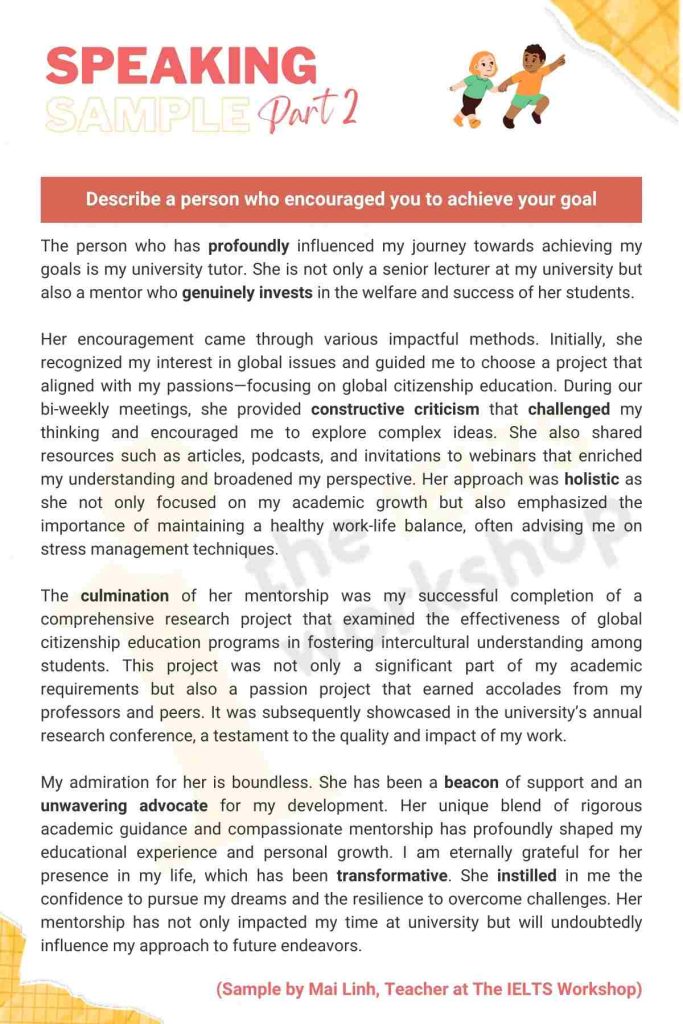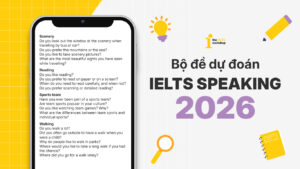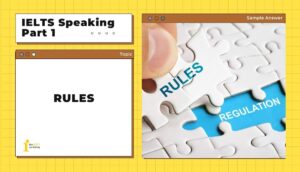Trong chuyên mục giải đề IELTS Speaking kỳ này, cùng tham khảo chủ đề: “Describe a person who encouraged you to achieve your goal” qua bài mẫu của cô Mai Linh của The IELTS Workshop dưới đây nhé.
Part 2: Describe a person who encouraged you to achieve your goal
Describe a person who encouraged you to achieve your goal
You should say:
Who the person is
How he/she encouraged you
What goal you achieved
And explain how you feel about this person
Dưới đây là bài mẫu cho topic “Describe a person who encouraged you to achieve your goal”.
1. Bài mẫu (Sample)

2. Từ vựng (Vocabulary)
- Profoundly (adv) – sâu sắc: Used to describe something very great or intense.
- Genuinely (adv) – thực sự: Truly or sincerely, indicating authenticity.
- Invest (v) – đầu tư: To devote time, effort, or resources to something, expecting beneficial returns.
- Holistic (adj) – toàn diện: Emphasizing the importance of the whole and the interdependence of its parts.
- Constructive criticism (n) – lời phê bình mang tính xây dựng: Feedback that is meant to improve and help, not just criticize.
- Challenge (v) – thách thức: Invited or caused to engage in something that requires skill, effort, or perseverance.
- Culmination (n) – điểm cao nhất, kết quả cuối cùng: The highest or climactic point of something, especially as attained after a long time.
- Beacon (n) – ngọn hải đăng, ngọn đuốc: A source of light or inspiration.
- Unwavering (adj) – kiên định: Steady or resolute; not wavering.
- Advocate (n) – người ủng hộ: A person who publicly supports or recommends a particular cause or policy.
- Transformative (adj) – có tính chuyển đổi: Causing a major change to something or someone, especially in a way that makes it or them better.
- Instill (v) – gây ảnh hưởng sâu sắc: Gradually but firmly establish an idea or attitude into a person’s mind.
3. Grammar
- During our bi-weekly meetings, she provided constructive criticism that challenged my thinking and encouraged me to explore complex ideas.
Từ “that” trong câu trên là một đại từ quan hệ, dùng để nối mệnh đề quan hệ với danh từ đi trước nó, ở đây là “constructive criticism”. Mệnh đề quan hệ “that challenged my thinking and encouraged me to explore complex ideas” giúp làm rõ và cung cấp thêm thông tin về “constructive criticism”, nói rằng loại phê bình này đã thách thức suy nghĩ của người nói và khuyến khích họ khám phá những ý tưởng phức tạp.
- During our bi-weekly meetings, she provided constructive criticism that challenged my thinking and encouraged me to explore complex ideas.
Trong câu này, từ “that” lại một lần nữa là một đại từ quan hệ, nối mệnh đề quan hệ với danh từ phía trước nó, là “a comprehensive research project”. Mệnh đề quan hệ “that examined the effectiveness of global citizenship education programs in fostering intercultural understanding among students” giải thích và cung cấp thông tin chi tiết về nội dung cụ thể của dự án nghiên cứu, nói rằng dự án này đã khảo sát hiệu quả của các chương trình giáo dục công dân toàn cầu trong việc thúc đẩy sự hiểu biết liên văn hóa giữa các sinh viên.
Part 3
Do you think children are more likely to achieve their goals if they are encouraged?
What should parents do if their children don’t want to study?
Who do you think should set goals for children?
Who plays a more important role in children’s education, parents or teachers?
Is money the only motivation for people to work hard?
Which is more important, competition or cooperation?
1. Do you think children are more likely to achieve their goals if they are encouraged?
Absolutely, I firmly believe that encouragement plays a pivotal role in a child’s ability to achieve their goals. When children are encouraged, they receive not only the affirmation of their capabilities but also the emotional and psychological support needed to persevere in the face of challenges. For instance, positive reinforcement from parents and teachers can significantly boost a child’s self-esteem and motivation. This, in turn, enhances their resilience, enabling them to tackle obstacles more effectively and maintain their pursuit of goals. Moreover, encouragement can foster an environment of creativity and exploration, where children feel safe to experiment and learn from their failures without fear of judgment. This kind of supportive atmosphere is crucial for personal development and achieving long-term success.
- Pivotal (adj) – trọng yếu: Extremely important and affecting the success of something. In this context, it describes the crucial role of encouragement in achieving goals.
- Affirmation (n) – sự khẳng định: The action of confirming something to be true. Used here to mean that encouragement helps children believe in their own abilities.
- Persevere (v) – kiên trì: Continue in a course of action even in the face of difficulty. Highlights the idea that encouragement helps children continue striving towards their goals despite challenges.
- Positive reinforcement (n) – sự củng cố tích cực: The process of encouraging or establishing a pattern of behavior by offering rewards when the behavior is exhibited. Explains how specific types of encouragement, like praise or rewards, can motivate children.
- Self-esteem (n) – lòng tự trọng: Confidence in one’s own worth or abilities. It’s important for children as it influences their motivation and overall mental health.
- Resilience (n) – sự kiên cường: The capacity to recover quickly from difficulties; toughness. The ability to bounce back from setbacks is essential for long-term success.
- Obstacles (n) – chướng ngại vật: Things that block one’s way or prevent or hinder progress. Used here to refer to challenges that children might face while pursuing their goals.
- Foster (v) – thúc đẩy: Encourage the development of something. In the sample, it’s used to describe how encouragement helps develop a creative and safe environment.
- Exploration (n) – sự khám phá: The action of traveling in or through an unfamiliar area in order to learn about it. Used metaphorically to describe how children try new things and learn.
- Judgment (n) – sự phán xét: The ability to make considered decisions or come to sensible conclusions. Mentioned in the context of fearing negative evaluation, which can hinder development.
2. What should parents do if their children don’t want to study?
If children show disinterest in studying, parents should first try to understand the underlying reasons. Engaging in open dialogue can help uncover if there are specific challenges or disinterests at school. It’s essential for parents to show empathy and support rather than impose pressure, which might exacerbate the issue. Additionally, parents could explore alternative learning methods or subjects that might spark their child’s interest, such as interactive educational tools or extracurricular activities that align with their passions. Sometimes, a more hands-on approach or practical application of subjects can reignite a child’s enthusiasm for learning.
- Disinterest (n) – sự không hứng thú: Lack of interest in something. In this context, it refers to children not wanting to study.
- Engaging (adj) – tham gia, hấp dẫn: Attracting or holding interest. Used here to describe the act of initiating conversation that is open and involving.
- Empathy (n) – sự đồng cảm: The ability to understand and share the feelings of another. Essential for parents to connect with their children on an emotional level.
- Impose (v) – áp đặt: Force something to be applied or put into place. Describes a situation where parents might forcefully apply pressure on their children.
- Exacerbate (v) – làm trầm trọng thêm: Make a problem, bad situation, or negative feeling worse. Relevant here as applying pressure could worsen a child’s reluctance to study.
- Alternative (adj) – thay thế: Offering another option or choice. Points to different methods or subjects that could interest the child.
- Interactive (adj) – tương tác: Involving communication between people, or allowing a person to actively participate. Describes educational tools that engage children in active learning.
- Extracurricular (adj) – ngoại khóa: Activities or subjects outside the regular curriculum. Suggests areas that might be more appealing to a child’s interests.
- Hands-on (adj) – thực hành: Involving active participation; practical rather than theoretical. Indicates a learning style that could be more engaging for some children.
- Reignite (v) – khơi dậy lại: Awaken once more; bring back to a state of increased activity or enthusiasm. Used to describe how changing the learning approach might revive a child’s interest in studying.
3. Who do you think should set goals for children?
I believe that setting goals for children should be a collaborative effort involving both parents and children themselves. Parents have the experience and understanding to guide their children towards realistic and beneficial goals. However, it’s important for children to have a say in this process as well, to ensure they feel motivated and engaged with their own objectives. Teachers can also play a crucial role, especially in educational settings, by helping to identify a child’s strengths and potential areas for growth. This combined approach helps align the goals with the child’s interests and abilities, making them more attainable and meaningful.
- Collaborative (adj) – hợp tác: Involving two or more parties working together towards a common goal. It emphasizes the team effort in goal setting.
- Realistic (adj) – thực tế: Achievable and practical. Used to describe goals that are within reach and suitable for the child’s age and ability.
- Beneficial (adj) – có lợi: Producing good results or helpful effects. Goals should be beneficial, leading to positive outcomes for children
- Motivated (adj) – có động lực: Having enthusiasm and interest to do something. Important for children to feel motivated by their own goals.
- Engaged (adj) – tham gia tích cực: Actively involved and interested. Highlights the need for children to be active participants in setting their goals.
- Objectives (n) – mục tiêu: Specific results that a person or system aims to achieve within a time frame. Synonymous with goals, but often used in a more formal setting.
- Crucial (adj) – quan trọng: Extremely important or necessary. Describes the role of teachers in the goal-setting process.
- Strengths (n) – điểm mạnh: Natural abilities or qualities that individuals excel in. Recognizing these is key for setting appropriate goals.
- Potential (n) – tiềm năng: The ability to develop, achieve, or succeed in the future. Identifying potential areas for growth is part of effective goal setting.
- Attainable (adj) – có thể đạt được: Possible to achieve. Ensures that goals set are within the ability to be reached.
- Meaningful (adj) – có ý nghĩa: Having significance, purpose, or value. Goals should be meaningful to ensure they have a positive impact on the child’s development.
4. Who plays a more important role in children’s education, parents or teachers?
Deciding who plays a more important role in a child’s education between parents and teachers is challenging because both contribute significantly in different ways. Teachers are instrumental in providing formal education and imparting knowledge in a structured environment. They introduce children to new concepts, foster critical thinking, and guide them through the academic curriculum. On the other hand, parents play a crucial role in nurturing emotional intelligence, instilling values, and providing support and motivation at home. They also influence their children’s attitudes towards education and learning. Ideally, a balanced synergy between parents and teachers is essential, as each supports different aspects of a child’s development. Therefore, both are equally important and their roles are complementary rather than comparative.
- Instrumental (adj) – có vai trò quan trọng: Essential in facilitating a process. Used here to describe teachers’ roles in formal education.
- Impart (v) – truyền đạt: Conveying knowledge or information. Highlights how teachers communicate academic content.
- Structured environment (n) – môi trường có cấu trúc: An organized setting, typically referring to classrooms where learning is systematically planned.
- Foster (v) – thúc đẩy: Encourage the development of something. Used here to indicate how teachers promote critical thinking.
- Nurturing (v) – nuôi dưỡng: Helping to grow or develop. Refers to parents’ role in developing emotional and social skills.
- Emotional intelligence (n) – trí tuệ cảm xúc: The ability to understand and manage one’s own emotions and relate to those of others.
- Instilling (v) – gây ảnh hưởng sâu sắc: Gradually but firmly establishing an idea or attitude in a person’s mind. Describes how parents teach values.
- Synergy (n) – sự kết hợp: The interaction or cooperation of two or more organizations, substances, or other agents to produce a combined effect greater than the sum of their separate effects. Used to suggest the collaborative effect of parents and teachers.
- Complementary (adj) – bổ sung cho nhau: Completing or enhancing each other’s qualities. Indicates that the roles of parents and teachers enhance each other.
- Comparative (adj) – so sánh: Pertaining to or based on comparison. States that the roles should not be evaluated against one another but rather seen as jointly beneficial.
5. Is money the only motivation for people to work hard?
No, I don’t believe that money is the only motivation for people to work hard. While financial compensation is undoubtedly a significant incentive for many, there are several other factors that motivate individuals. For instance, personal fulfillment and passion for one’s work can be powerful motivators. People often pursue careers that align with their personal interests and values, which provides a sense of satisfaction that goes beyond monetary rewards. Additionally, the desire for career advancement and professional recognition also drives many to excel in their roles. Building a reputation and achieving a sense of accomplishment are also key motivators. Furthermore, social factors, such as contributing to society or influencing positive change, can also inspire individuals to work diligently. Therefore, while money is an important motivator, it is certainly not the only one.
- Compensation (n) – sự bồi thường, trả công: Payment or money received as payment for work, emphasizing the financial aspect of motivation.
- Incentive (n) – động lực: Something that encourages or motivates someone to do something, broader than just money.
- Personal fulfillment (n) – sự thỏa mãn cá nhân: The achievement of something desired or promised, especially as relates to personal ambitions or well-being.
- Passion (n) – đam mê: A strong and barely controllable emotion, especially about something one loves to do, often a driving force in career choices.
- Career advancement (n) – thăng tiến nghề nghiệp: The process of moving up in one’s career, often through promotions or gaining more significant responsibilities.
- Professional recognition (n) – sự công nhận chuyên nghiệp: Receiving acknowledgment and esteem in one’s field or industry, a non-monetary but valued form of motivation.
- Reputation (n) – danh tiếng: The beliefs or opinions generally held about someone or something, a significant non-financial motivator for professional behavior.
- Accomplishment (n) – thành tựu: Something achieved successfully, typically by effort, courage, or skill, driving individuals to work hard.
- Social factors (n) – yếu tố xã hội: Aspects of society that influence an individual’s life and behavior, such as community impact or social responsibility.
- Positive change (n) – thay đổi tích cực: Modifications or transformations that result in favorable outcomes, often a goal for those motivated by societal contributions.
6. Which is more important, competition or cooperation?
Deciding whether competition or cooperation is more important depends largely on the context. In many scenarios, competition can drive innovation and improvement, pushing individuals and companies to excel and achieve higher standards. It fosters a spirit of striving for excellence and can lead to significant advancements in technology and services. On the other hand, cooperation is fundamental in environments where teamwork and collective effort are essential. It promotes sharing of ideas, resources, and responsibilities, which can lead to more sustainable success and can help solve complex problems that are beyond the capability of any single individual or entity. In reality, a balance of both competition and cooperation often yields the best outcomes, as each plays a role in fostering a dynamic and effective environment.
- Context (n) – bối cảnh: The circumstances or setting surrounding an event or situation, emphasizing the importance of situation-specific decisions.
- Innovation (n) – sự đổi mới: The process of making changes by introducing new methods, ideas, or products, often driven by competition.
- Improvement (n) – sự cải thiện: The process of enhancing existing conditions or qualities, typically related to performance or productivity in competitive scenarios.
- Fosters (v) – thúc đẩy: Encourages or promotes the development of something, used here to describe how competition and cooperation support different growth aspects.
- Striving for excellence (phrase) – phấn đấu vì sự xuất sắc: Working hard towards achieving the highest standard, a motivation often fueled by competition.
- Teamwork (n) – làm việc nhóm: The combined action of a group, especially when effective and efficient, central to the concept of cooperation.
- Collective effort (n) – nỗ lực nhiều nguồn tập hợp: Work done together by a group of people to achieve a common goal, highlighting the essence of cooperation.
- Sustainable success (n) – thành công bền vững: Achievements that can be maintained over time without depleting resources or causing other adverse effects, a result of effective cooperation.
- Solve complex problems (phrase) – giải quyết các vấn đề phức tạp: Addressing issues that are too intricate or difficult for a simple or straightforward solution, often requiring cooperative approaches.
- Dynamic (adj) – năng động: Characterized by constant change, activity, or progress, describing an environment that benefits from both competition and cooperation.
Bài mẫu bởi cô Mai Linh – Giáo viên The IELTS Workshop
Trên đây là bài mẫu cho topic: Describe a person who encouraged you to achieve your goal. Các bạn có thể tham khảo các bài mẫu IELTS Speaking Part 2 khác của The IELTS Workshop tại đây!
Ngoài ra, khoá học Senior của The IELTS Workshop sẽ giúp bạn nâng cao kỹ năng cũng như xây dựng chiến lược trả lời câu hỏi, tham khảo ngay nhé!!









